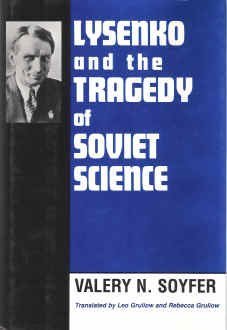Lysenko and the Tragedy of Soviet Science
In this book, Dr. Soyfer, a former Soviet scientist who had met Lysenko, documents the destruction of science and scientists under the influence of Lysenko. Contrary to numerous opinions, Lysenko was an poorly educated agronomist who happened to have been in the right place at the right time: In the '30s, "Pravda" wrote him up as a pioneering scientist. Recognizing that newspapers and popular support could fuel his rise to the top of Soviet society, he set about making a name for himself as a scientist in non-academic journals and periodicals. His peasant upbringing and miraculous findings--never empirically proven or duplicated--made him a star proletarian scientist, the kind needed to bring about true Communism. Along his way to the top, he was assisted by many people who thought him a sincere, but ill preparted, scientist; he later had many of these people purged after gaining the almost total support of Stalin and Khrushchev. His grand claims of producing superior cattle and wheat, among other things, consistently failed, yet no one dared oppose or even question his policies. Whether to propel himself upward, bring down the academics he apparently detested, or protect himself and his "science", Lysenko nearly eliminated all serious work in genetics, agriculture, and biology from the '30s into the '60s. Numerous scientists were exiled, fired, or executed during his reign as the people's scientist; according to the author, the effects still linger in Russia. An amazing story of how, when politics decrees what science is acceptable and how it is going to work in the political paradigm, the results can be tragic.
Format:Hardcover
Language:English
ISBN:0813520878
ISBN13:9780813520872
Release Date:June 1994
Publisher:Rutgers University Press
Length:410 Pages
Weight:1.70 lbs.
Dimensions:9.5" x 1.3" x 6.5"
Customer Reviews
1 rating
Politics destroys empirical science
Published by Thriftbooks.com User , 26 years ago
Though no scientist, I had heard the name of Lysenko passed about for years. He seemed to have been a mad scientist, creating bizarre hybrids and ecological disasters that plague Russia to this very day. That one man could do so much damage intrigued me, so I sought to learn more about him.In this book, Dr. Soyfer, a former Soviet scientist who had met Lysenko, documents the destruction of science and scientists under the influence of Lysenko. Contrary to numerous opinions, Lysenko was an poorly educated agronomist who happened to have been in the right place at the right time: In the '30s, "Pravda" wrote him up as a pioneering scientist. Recognizing that newspapers and popular support could fuel his rise to the top of Soviet society, he set about making a name for himself as a scientist in non-academic journals and periodicals. His peasant upbringing and miraculous findings--never empirically proven or duplicated--made him a star proletarian scientist, the kind needed to bring about true Communism.Along his way to the top, he was assisted by many people who thought him a sincere, but ill preparted, scientist; he later had many of these people purged after gaining the almost total support of Stalin and Khrushchev. His grand claims of producing superior cattle and wheat, among other things, consistently failed, yet no one dared oppose or even question his policies. Whether to propel himself upward, bring down the academics he apparently detested, or protect himself and his "science", Lysenko nearly eliminated all serious work in genetics, agriculture, and biology from the '30s into the '60s. Numerous scientists were exiled, fired, or executed during his reign as the people's scientist; according to the author, the effects still linger in Russia.An amazing story of how, when politics decrees what science is acceptable and how it is going to work in the political paradigm, the results can be tragic.





